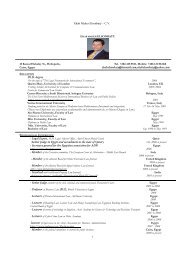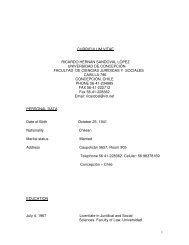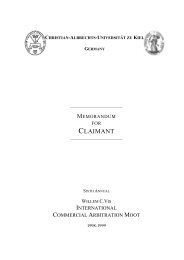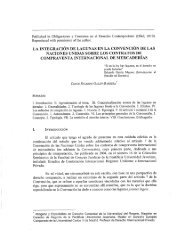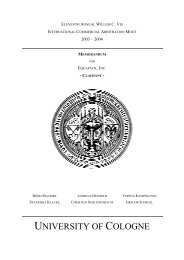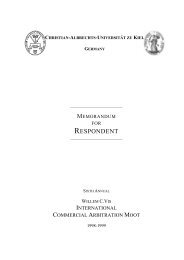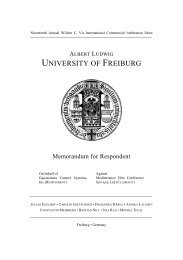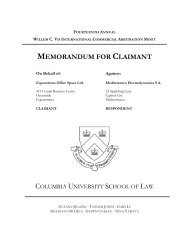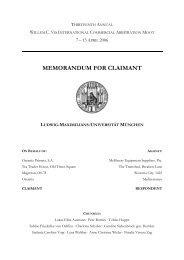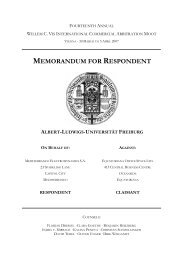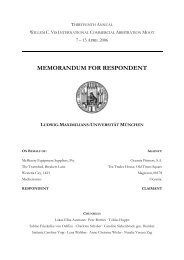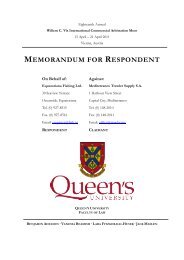Equapack, Inc. v. Medi-Machines S.A. Memorandum for Medi ...
Equapack, Inc. v. Medi-Machines S.A. Memorandum for Medi ...
Equapack, Inc. v. Medi-Machines S.A. Memorandum for Medi ...
Create successful ePaper yourself
Turn your PDF publications into a flip-book with our unique Google optimized e-Paper software.
IV. REGARDLESS OF WHETHER RESPONDENT COMMITTED A FUNDAMENTAL<br />
BREACH, CLAIMANT DID NOT MAKE AN EFFECTIVE AVOIDANCE.<br />
60. CLAIMANT purports to have avoided the contract under Article 49(1) CISG.<br />
[<strong>Memorandum</strong> <strong>for</strong> Claimant 59-60]. This is not the case, even assuming <strong>for</strong> the sake of<br />
argument that RESPONDENT committed a fundamental breach. First, CLAIMANT lost the<br />
right to avoid the contract because it was unable to return the goods to RESPONDENT in the<br />
condition in which they were received (A.). Second, it did not make an adequate valid<br />
declaration of avoidance (B.).<br />
A. CLAIMANT lost the right to avoid because it was unable to return the goods in<br />
substantially the condition in which they were received.<br />
61. A buyer loses the right to declare the contract avoided if “it is impossible <strong>for</strong> him to make<br />
restitution of the goods substantially in the condition in which he received them.” [Art. 82(1)<br />
CISG]. Both parties recognize that the machines are now severely corroded and not in the<br />
condition in which they were received. [Claimant’s Ex. 6; Statement of Case 8].<br />
62. CLAIMANT nonetheless suggests that it retains the right to avoid under Article 82(2)(c),<br />
[see <strong>Memorandum</strong> <strong>for</strong> Claimant 63], because the change in the condition of the goods occurred<br />
“in the course of normal use be<strong>for</strong>e he discovered or ought to have discovered the lack of<br />
con<strong>for</strong>mity.” [Art. 82(2)(c) CISG]. CLAIMANT makes no argument that its action in using the<br />
machines to process salt constituted “the course of normal use.” Hence, CLAIMANT has failed<br />
to meet its burden of proof. [OLG Stüttgart, 12 Mar. 2001 (Germany)].<br />
63. Furthermore, CLAIMANT fails to address the fact that it continued to use the machines<br />
(whether or not in the course of normal use) after it had reason to discover any noncon<strong>for</strong>mity.<br />
The processing limitations of the Model 14 machines should have been clear to CLAIMANT at<br />
the time of delivery. CLAIMANT admits that it noticed “at the beginning” that the machines<br />
“were slower <strong>for</strong> most products than had been [its] previous experience with similar machines.”<br />
[Notice of Arbitration 8]. Yet it continued to use machines <strong>for</strong> over a month after the machines<br />
were placed into service, thereby altering their condition. [Id.]. Hence, CLAIMANT lost any<br />
right to rely on the processing speed of the machines as a ground <strong>for</strong> avoidance.<br />
64. With regard to the salt, first, the fact that the Model 14 machines were not made of stainless<br />
steel should have been apparent to CLAIMANT through the inspection that CLAIMANT was<br />
21



